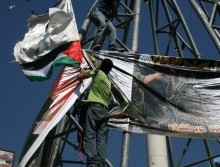 UNITED NATIONS—Despite strong and public resistance from the United States to a Palestinian bid for United Nations membership in the UN Security Council, the Palestinians are still planning to submit their bid for consideration, an official said Thursday. According to the WAFA Palestinian news agency, Palestinian official Yasser Abed Rabbo told Voice of Palestine radio that Palestinian President Mahmoud Abbas would make the membership application on Friday.
UNITED NATIONS—Despite strong and public resistance from the United States to a Palestinian bid for United Nations membership in the UN Security Council, the Palestinians are still planning to submit their bid for consideration, an official said Thursday. According to the WAFA Palestinian news agency, Palestinian official Yasser Abed Rabbo told Voice of Palestine radio that Palestinian President Mahmoud Abbas would make the membership application on Friday.
The comments come as an anonymous Israeli official told The Mideast Update by phone that as of Wednesday evening it appears the Palestinians would not receive the nine yes votes required in the Security Council to force a US veto, although the situation was “still fluid.”
WAFA reported that Abed Rabbo, secretary of the Palestine Liberation Organization (PLO) Executive Committee, said the Palestinians were still trying to convince the nations who have said they will abstain or vote negatively to support the Palestinians instead.
Abed Rabbo, in his comments to Voice of Palestine radio, said there was no arrangement in place to grant the Security Council extra time to consider their application, beyond the typical legal time taken by the Council for any issue.
The Palestinian official’s reiteration of their plans to go to the UN for membership came one day after US President Barack Obama said in a speech to the UN General Assembly that a UN resolution could not resolve the decades-old conflict. He called for negotiations between Israel and the Palestinians instead. Obama and Abbas met later that day. According to a transcript of comments to reporters provided by the White House, US Deputy National Security Advisor for Strategic Communications Ben Rhodes said that Obama told Abbas of his opposition to a Security Council statehood bid and that the US would veto it if necessary.
On Wednesday, around the time of the Obama-Abbas meeting, the anonymous Israeli official expressed the hope in comments to The Mideast Update that the US leader would convince the Palestinian leadership “to shelve their UN agenda and to return to direct talks with Israel.” Based on Abed Rabbo’s comments on Thursday, it appears Abbas has not changed his mind.
The US isn’t the only nation apparently opposed to Security Council involvement in the Palestinian full UN membership matter. France, which also holds veto power in the UN Security Council, hinted towards their stance on Wednesday as well.
According to a draft of a translation of his comments provided by the French, President Nicolas Sarkozy told the General Assembly in his speech that the Palestinians cannot acquire full membership now due to the “lack of trust between the main parties” and the risk of violence in response to a Security Council veto.
However, the Palestinians do have a less significant and more symbolic alternative to full UN membership: going to the UN General Assembly for a UN status upgrade that stops short of full membership. That would lack the legal power of the Security Council route, but would avoid the US veto and could give the Palestinians another resource in a new diplomatic and legal battle with Israel.
Sarkozy actually supported an upgrade to UN observer state, but said it would come on the condition that the Palestinians “commit to avoid using this new status to undertake actions incompatible with the continuance of negotiations.”
Sarkozy also called for a new timeline for peace talks: one year for a deal to be reached. His proposal included one month for negotiations to resume and six months for an agreement on borders and security.
In addition, Sarkozy decried preconditions to talks, without mentioning the Palestinians specifically. Israel has repeatedly called for the renewal of negotiations, but the Palestinians have demanded Israel halt settlement construction first.
Israel did agree to a substantial 10-month partial settlement construction freeze in 2009-10, but the Palestinians waited to resume direct negotiations with Israel until the freeze was nearing its end. Peace talks were suspended by the Palestinians in 2010 following the end of the settlement freeze.
(By Joshua Spurlock, www.themideastupdate.com, September 22, 2011)
